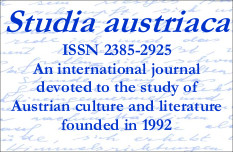Snobismus als geistige Macht. Arthur Schnitzlers Zeitkritik und die Debatte um den “Kulturkrieg”
[Snobbery as Intellectual Power. Arthur Schnitzler’s Critique of his Time and the Cultural Debates about World War I]
DOI:
https://doi.org/10.13130/1593-2508/8538Abstract
After the publication of Thackeray’s The Books of Snobs (1848) the concept of “snob” became popular in German-speaking countries with the meaning of dandy and aesthete. In his diaries, letters, and posthumous notes, Arthur Schnitzler refers very critically to snobbery as the “illness of the time”. This article argues that his critique does not merely address the radical aesthetical attitudes of his contemporaries (among them, e.g. Hofmannsthal). The purpose of Schnitzler’s critique is rather to denunciate the ideological implications of these attitudes – especially with regard to positions taken by many intellectuals in the debate about World War I.
Downloads
Published
How to Cite
Issue
Section
License
Copyright (c) 2017 Studia austriaca

This work is licensed under a Creative Commons Attribution-ShareAlike 4.0 International License.
Licensed under a Creative Commons Attribution 4.0 International License
This journal allows the author(s) to hold the copyright without restrictions.
This journal allows the author(s) to retain publishing rights without restrictions.







